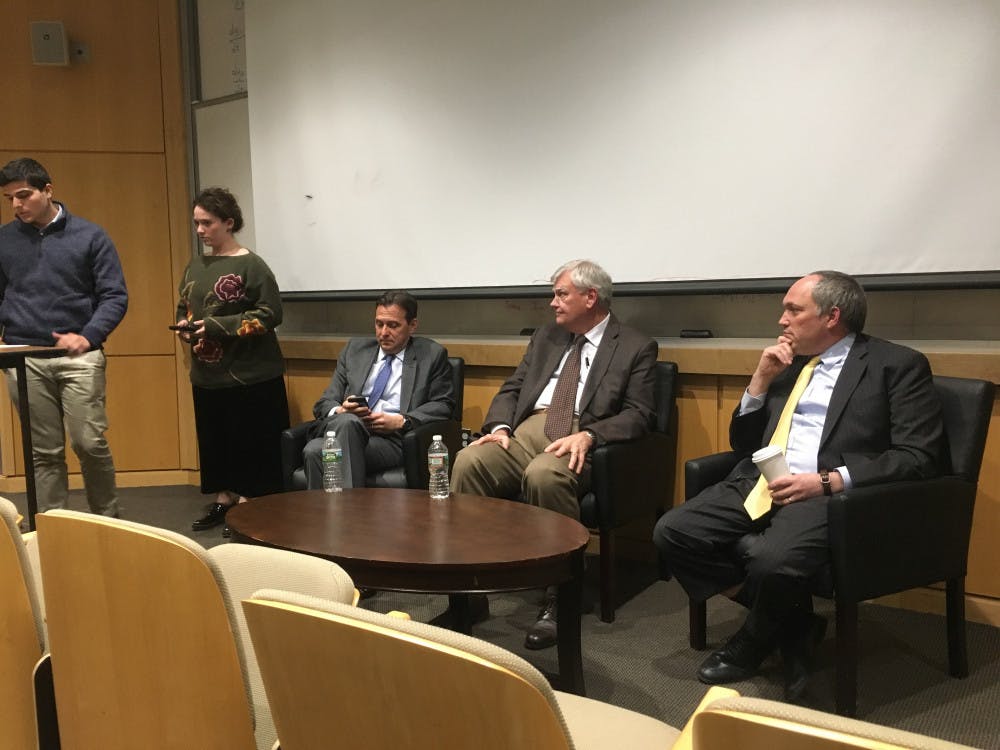A bipartisan discussion about U.S. policy in the Middle East rehashed long-standing disagreements but found common ground in positioning foreign policy moving forward. The talk, which was co-hosted by Brown Students for Israel and the American Enterprise Institute at Brown, featured Brian Katulis, senior fellow from liberal thinktank Center for American Progress, and Michael Rubin, resident scholar at conservative thinktank American Enterprise Institute.
Katulis and Rubin debated the history of U.S. intervention in Iraq and how current regional changes would affect U.S. policy. Katulis worked at the National Security Council and the U.S. Departments of State and Defense under the Clinton administration. Rubin, whose area of expertise is Iran, served as a staff adviser for Iran and Iraq at the Pentagon from 2002 to 2004. Brian Atwood, senior fellow at the Watson Institute for International and Public Affairs, moderated the discussion.
The speakers clashed on the subject of the Iraq War, to which Katulis said he was vehemently opposed. On the other hand, Rubin said he would not apologize for the war. “I did not see it as a choice. I saw it as the status quo breaking down,” he said.
Rubin also discussed his optimism regarding Iraq following his last trip to Baghdad earlier this year. “Sixty percent of Iraqis were born post 2000. Forty percent have been born after 2003,” he said. “We have a new generation that is not embracing the religious extremism and sectarian rhetoric as the panacea for their problems.”
Katulis and Rubin both critiqued the Obama administration’s attempts to remain impartial in the region’s conflicts, describing the strategy as “unrealistic.”
Rubin pointed out a lack of coherence on Middle East policy since the Clinton administration, which was exacerbated by Obama’s unwillingness to take a side.
“My big criticism of the Obama administration is that the Syrian civil war … has had huge strategic consequences,” Katulis said. “We would not have a President Trump today if we had had a meaningful engagement about the (war).” Terrorism and the civil war have “led to a re-emergence of the politics of fear” across the world, he said.
“By trying to stay neutral, it’s almost as if we are a gambler that only wants to put his cards down on the blackjack table after he’s seen everyone else’s cards,” Rubin added. “In a region where people see policy and diplomacy as a zero-sum game, people think that if the Americans aren’t supporting us, then they must be supporting the other guys.”
Rubin and Katulis also agreed that it is necessary for U.S. policy to evolve from its current reactionary state to a more proactive approach. “We’re all debating the past, whereas no one’s debating about the future,” Rubin said. He pointed to the eventual phasing out of restrictions included in the Iran nuclear deal and the declining health of both Ali Khamenei, supreme leader of Iran, and Mahmoud Abbas, president of the State of Palestine, as examples of topics that merit more attention.
When discussing the current administration, the speakers both said that they do not believe the United States will go to war with Iran. Katulis referred to a lack of concrete policy behind Trump’s actions, which he described as posturing.
However, he noted that conflict breaking out in the fight for dominance in the region could draw in the United States.
“Every administration tends to be defined (by) the crisis it never saw coming,” Rubin added.
The Israel-Palestine conflict was touched upon briefly, with Katulis expressing his pessimism regarding any possibility of a two-state solution.
“(Jared) Kushner and (Jason) Greenblatt’s quest for the perfect two-state solution is like O.J. (Simpson)’s quest for the real killer,” Rubin said. He added that he does not believe it is the most urgent problem to address within the region, because while the other Arab nations support Palestine, they are not particularly focused on the conflict.
Broadly, Rubin cautioned the United States against thinking inwardly, noting that it must consider how its actions will be interpreted by players in the region.





